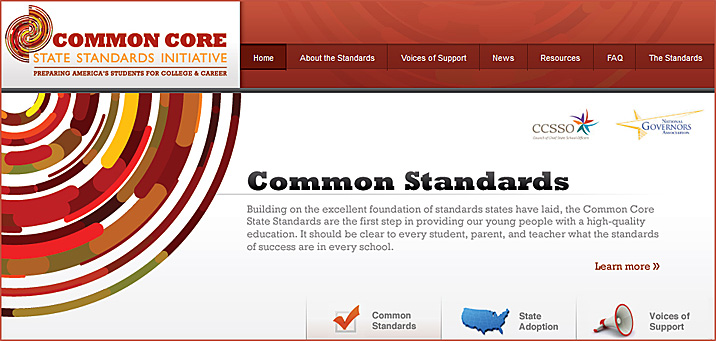From DSC:
I haven’t had the chance to research this much, but I wanted to post several items re: the Common Core Standards. The jury is still out with me as to what I think about them. My initial concerns center around the ideas/curriculums and course offerings/assessment tools involved with the word “standards” — with implementing things that result in clear, consistent expectations.
I have become increasingly hesitant towards words like “standards” and “expectations” — at least as these words are currently being used in this context. I’m not saying that the Common Core Standards will try to further pound round pegs into square holes — though that type of thing captures my hesitation here — as not everyone has the same gifts, abilities, and passions. Much of the current K-12 systems focus so much on STEM-related items — at the expense of so much more that’s out there in the world today.
With that said, I like the idea of getting students prepared — as much as possible — for helping them hit the ground running later on in life when they will need to either go to college and/or get a job. I can see where if a student moves from one district/state to another, how it can be very helpful to have a shared foundation from which to develop the student’s current educational needs and plans.
Some items on this:
- Common Core State Standards: A note to parents — from Core 4 All by Alan Matan
By the way, I appreciate Alan’s statement in his posting that asserts:
“The 21st century skills embedded in the Common Core will pave the way for students to think, reflect, analyze, influence, evaluate, and communicate.” - Implementing Common Core Standards — from Advancing the Teaching Profession by Susan Graham
- CEP reports on progress of Common Core — from Educational Publishing
Implementation of the Common Core Standards is proceeding with little resistance, but challenges remain in funding and guidance, according to a new study from the Center on Education Policy (CEP). CEP undertook the study to determine how far along each of the adopting states was in implementing the Common Core Standards and what their perceptions are of the standards. - CoreStandards.org
From DSC:
What do you think? What are the pros and cons of implementing the Common Core Standards? From the teacher’s viewpoint? From the student’s viewpoint? From the administrator’s viewpoint? From the parent’s viewpoint?
I look forward to learning more about them and to hearing others’ perspectives on them.










Daniel, first off, thank you for referencing my post. I am excited about the adoption of the Common Core State Standards because it focuses on the learning of much needed skills that will better prepare our youth for their post-secondary opportunities. I believe the underlying reason there is so much debate and hesitation over these standards is that it challenges the status quo of teaching. Using the Common Core State Standards as a vehicle to drive instruction will change the student mindset from “I am learning about…” to “I am learning how to…” Teachers traditionally used their content expertise to teach about things/events/concepts. Students were tested on the content they memorized. The skills were generally learned indirectly. Today, we have an opportunity to create curriculum that focuses on skills first. It is a paradigm shift in education. I ask teachers to try this: 1. Choose one/two Common Core Standards to focus on. 2. Create a pre-assessment that will measure those particular skills using your content to gauge where your students are. 3. Teach your unit, always focusing on the skill being learned using instructional strategies that are based on proven research data. 4. Give post-assessment to measure what students have learned (skills and content). I will take some effort to change our way of creating lessons and units. But, in the end, it will better prepare our students to be the leaders of tomorrow.
Thanks Alan for the comment here — much appreciated.
Your 50,000-foot statement about the impact of the standards (below) resonated with me:
It speaks to the change of focus — i.e. on the skills and being able to do things, not just on the content/knowledge of facts only. I do wonder if employers of the future are going to care more about what one can DO for them.
Thanks again Alan. How about other folks/perspectives out there? Please chime in.
Daniel